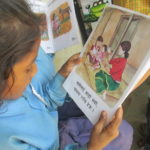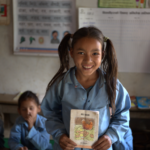Sang Sangai Technical Brief Full
The Sang Sangai – “Learning Together: Engaging Mothers and Energizing Communities to Support Girls’ Education in Nepal’s Terai” project supported education for 23,164 girls in Nepal’s most disadvantaged Terai region. The project was implemented in 4 core districts: Dhanusha, Mahottari, Sarlahi and Rautahat. This project gave girls an opportunity to gain basic literacy and numeracy skills, valuable health knowledge, and support to join the formal education system. The impact of these interventions on girls’ lives were accelerated by engaging their mothers through intergenerational activities, non-formal education, and Mithila arts. The mothers supported their daughters’ learning at home, enabled their daughters to join and persist in formal schooling, and motivated other members of the community to support girls’ learning. Sang Sangai – Learning Together worked with 300 schools to help them better meet the needs of girls entering the formal
education system. With this vision, Sang Sangai partner NGOs worked with parents, communities, local government and line agencies of the Ministry of Education to implement the project which enabled thousands of out-of-school girls to achieve basic learning outcomes through nonformal education and transition to school to gain access to formal education. Local governments and school communities have made commitments to support these girls as they continue to learn. These technical briefs share key strategies, results, and lessons learned from this girls’ education project that can contribute to the evidence base, inform policy and help enable girls from the most disadvantaged communities to achieve their full potential through education.
From 2015 to 2017, World Education Nepal partnered with the World Food Programme
(WFP) to improve reading outcomes among Grade 1–Grade 3 students in 1,040 schools in six Far Western and Mid-Western food insecure districts that have generally poor educational outcomes. Results from the 2017 Early Grade Reading Assessment (EGRA) indicate that the collaborative effort to improve students’ ability to learn by addressing nutrition while simultaneously improving the quality of instruction has led to impressive results with a high return on investment: At baseline, only 1% of Grade 3 students could read at grade level; after two years, a majority of students can. This brief provides an overview of the project interventions and results.
View it here.
This technical brief shares results and lessons learned from World Education’s experience developing and piloting an early grade mathematics intervention and assessment in remote disadvantaged districts in West Nepal. Mathematics has been a neglected challenge in the education sector in Nepal, and that neglect shows in children’s poor learning outcomes. Yet, while much work remains to be done to ensure that all Nepali children have a chance to learn core mathematical concepts, the project has developed a strong foundation upon which future work can build. The lessons learned and recommendations stemming from this project should be of interest to policy-makers, program designers, and practitioners alike.
View it here.

World Education is pleased to share our annual report detailing our 2017 activities and impact. In 2017 alone, we expanded our programs to reach more people from Nepal’s least advantaged communities. We supported children with functional limitations, adults and children vulnerable to exploitation, migrant laborers, and flood affected communities, to name a few.
For more on our accomplishments over the last year, check out the full report: 2017 Annual Report

World Education is committed to improving the quality of early grade education in districts with poor educational outcomes. Under the Equity in Education in Disadvantaged Districts project funded by UNICEF, World Education implements programming to improve early grade reading and math achievement in four disadvantaged districts in Mid- and Far-Western Nepal: Achham, Bajura, Kalikot, and Mugu.
At the end of 2017, after only one year of programming, the project is showing impressive results, with students in intervention schools demonstrating greater learning gains than those in control schools. For more on the progress we’ve seen in Year 1, read our full summary brief:
UNICEF Early Grade Learning Year 1 Results Brief – April 2018
